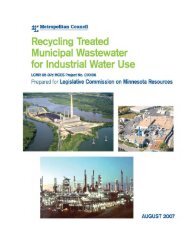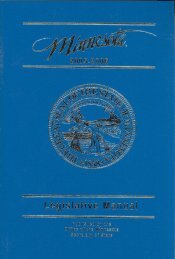Comprehensive Annual Financial Report - Minnesota State ...
Comprehensive Annual Financial Report - Minnesota State ...
Comprehensive Annual Financial Report - Minnesota State ...
Create successful ePaper yourself
Turn your PDF publications into a flip-book with our unique Google optimized e-Paper software.
Summary<br />
N ote:<br />
1<br />
(Continued)<br />
* Automatic lifetime<br />
Survivor Benefits are<br />
also available to the<br />
spouse of Police and<br />
Fire members who<br />
suffer total and permanent<br />
duty disability.<br />
Survivor benefits for<br />
other disabled members<br />
are only available<br />
if the member chooses<br />
a Survivor Option to<br />
their disability benefit.<br />
** Survivor benefits are<br />
immediately suspended<br />
for any survivor<br />
charged with causing<br />
the death of an association<br />
member. The<br />
benefit is permanently<br />
revoked upon conviction<br />
of such a crime.<br />
This is a summary<br />
of the laws, regulations,<br />
and administrative<br />
rules governing<br />
the Public<br />
Employees Retirement<br />
Association and<br />
should not be interpreted<br />
as a comprehensive<br />
explanation<br />
thereof. If there is any<br />
discrepancy between<br />
this summary and the<br />
actual law, the provisions<br />
of the law will<br />
govern.<br />
Public Employees<br />
Retirement Association<br />
of <strong>Minnesota</strong><br />
years of service if disabled outside the<br />
line of duty. If disabled in the line of duty,<br />
there is no minimum service requirement.<br />
MERF disability benefits are based<br />
upon the capability of performing a member's<br />
ordinary duties and require that the<br />
member be under age 60. If the disability<br />
is not duty related, a member must have<br />
a minimum of five years of public service<br />
The benefit formula is essentially the<br />
same as the retirement formula at age 60<br />
using the actual number of years worked<br />
with the additional years the member<br />
would have worked to reach age 60.<br />
There is a maximum of 22 years of total<br />
service unless the member has earned<br />
more than 22 years of service on the job.<br />
Neither the Defined Contribution Plan<br />
nor the <strong>State</strong>wide Volunteer Firefighter<br />
Retirement Plan have specific disability<br />
benefits. However, the DCP does allow<br />
for monthly benefit payments until the<br />
account balance is exhausted.<br />
Survivor Benefits<br />
PERA also provides survivor (death)<br />
benefits for families of members who<br />
qualify for such coverage should they die<br />
before commencing retirement benefit<br />
payments. The qualifications and types of<br />
benefits vary with each plan.<br />
A Lifetime Survivor Benefit is available<br />
to the surviving spouse of a Coordinated,<br />
Correctional, or Police and Fire member.<br />
For Police and Fire members, this benefit<br />
is based on either 50 percent of the<br />
member’s average salary during the six<br />
months prior to death or a formula using<br />
the member’s total years of service, highfive<br />
salary, age at death and age of the<br />
spouse. The surviving spouse benefit for<br />
Coordinated and Correctional members<br />
is only based on the formula. This benefit<br />
is payable to the spouse of a deceased<br />
member for life, even upon remarriage.*<br />
For the surviving spouse of a<br />
Coordinated or Correctional member,<br />
there are alternative term-certain benefits<br />
of 10, 15, or 20 years duration. The<br />
monthly payment, however, may not<br />
exceed 75 percent of the member’s average<br />
high five-year salary.**<br />
Dependent children of active or disabled<br />
Police and Fire members are eligible<br />
for benefits until age 18, or age<br />
23 if full-time students. In this case, the<br />
maximum family benefit is 70 percent of<br />
the member’s average monthly salary. If<br />
a Coordinated or Correctional member<br />
dies and there is no surviving spouse, any<br />
children under age 20 qualify to receive a<br />
monthly term-certain benefit.<br />
Instead of a monthly benefit, the surviving<br />
spouse, if a designated beneficiary, may<br />
elect a refund of any remaining employee<br />
contributions in the account, plus 6 percent<br />
interest compounded annually. However,<br />
a refund may not be elected if there are<br />
dependent children who are eligible for<br />
benefits.<br />
The surviving spouse of a MERF member<br />
with 20 or more years of service qualifies<br />
for the actuarial equivalent of the member's<br />
retirement benefit. If less than 20 years of<br />
service were earned, the spouse benefit is<br />
30 percent of the member's average salary<br />
over the six months preceding death, with<br />
10 percent of that salary for dependent children.<br />
The <strong>State</strong>wide Volunteer Firefighter<br />
Retirement Plan provides for payment of<br />
the member's accrued benefits to a surviving<br />
spouse or, if none, to minor children or,<br />
finally, the member's estate, based on retirement<br />
at age 50.<br />
Similarly, the Defined Contribution Plan<br />
provides for payment of the account balance<br />
to beneficiaries.<br />
Refunds<br />
Refunds of contributions are available<br />
at any time to members who leave public<br />
service and have not yet begun receiving<br />
a pension. The refund includes employee<br />
contributions plus 4 percent interest, compounded<br />
annually.<br />
A refund of member contributions plus<br />
interest may also be elected by the designated<br />
beneficiary of a member or former<br />
member who dies before reaching retirement.<br />
If there is no beneficiary, payment is<br />
made to the surviving spouse or, if none, to<br />
the estate of the deceased member or former<br />
member.<br />
If a retiree and designated survivor, if any,<br />
die before all employee contributions are<br />
paid in the form of a pension or benefits,<br />
the remaining balance would be paid in the<br />
same manner outlined for beneficiaries.<br />
No interest is paid to beneficiaries on the<br />
balance in an account if the member was<br />
receiving retirement benefits.
















